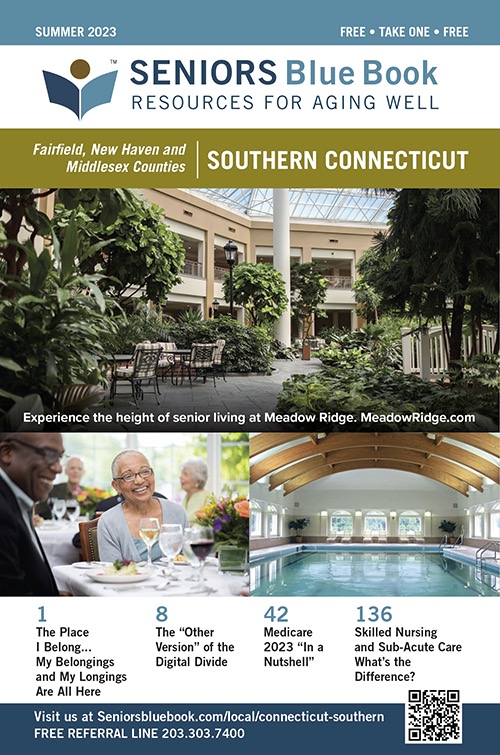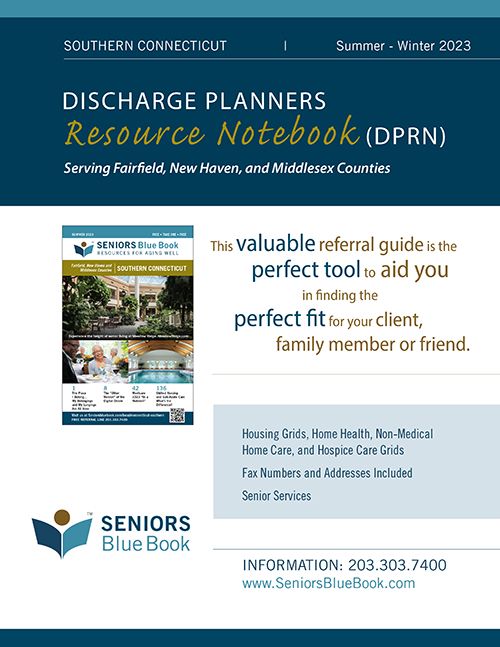Welcome to Seniors Blue Book's new home page for Southern Connecticut. Here you will find the latest information on senior care, housing, resources and local events for your community. This site compliments our local Seniors Blue Book and our edition for professionals, the Discharge Planners Resource Notebook. Feel free to email us and let us know how we can help you. We look forward to hearing from you soon! Carol Raitanen, Publisher

Browse through the most recent copy of your local SBB!
Click to view
Browse through the most recent copy of your local DPRN!
Click to view
.png)
.png)

Join us for a morning of networking and collaboration on how we can better serve the senior citizens of the Greater Milford Area.
Women-owned and operated law firm that focuses inthe areas of Elder Law, Estate Planning, Wills, Trusts, Probate,Medicaid/Title-19, and Real Estate Closings. Our friendly staff is ready towalk you through our appointment procedure and set up a time that works bestfor you and your family.
At The Greens at Cannondale assisted living community in Wilton, Connecticut, residents can live better thanks to chef prepared meals, a warm, inviting social life, frequent opportunities for mental stimulation, enjoyable recreational programs and regular physical activityall rejuvenating the mind, body and spirit.
Mind Matters Wellness Centers in Old Saybrook and Groton provide day care for adults affected by dementia and memory loss. Our participants enjoy activities tailored to their individual interests. We believe in offering a nurturing environment and maintaining a small group setting to foster social interaction and maintain high quality care.
The Stratford Visiting Nurse Association (VNA) is the regions most innovative, non-profit, and independent homecare agency, serving the needs of patients and families throughout Fairfield and New Haven counties since 1919.At the Stratford VNA, we practice Technology with Touch. This means we combine Mobile Health Technology (MHT) with personal care. With MHT we offer high-tech support right at home. At the same time, we know that technologyno matter how advancedcannot take the place of experienced, caring health specialists whose only goal is to assist in the patients successful recovery.
For those individuals who will need home care services and are in the process of a Medicaid spend down, consider an agency that you are able to transition to once you meet your income limit?To maintain continuity, one may consider a non-medical home care agency that provides services for both private pay and Medicaid home care clients. When you contract with an agency consider the issues that may arise once the spend down is complete. If your agency has not been credentialed by the Department of Social Services, you will be required to move to a home care agency that participates in the Medicaid waiver funded home care program (Connecticut Home Care Program for Elders (CHCPE).This transition can prove to be very disruptive to your loved one receiving care. For example, a key problem is lack of continuity. The care that has been provided is disrupted and the care will now be delivered from a range of unfamiliar caregivers. From the perspective of an elderly who may have short-term memory impairment and fears change, this can be very confusing. Your loved one typically develops an emotional bond with the caregiver that has been providing services. A bond is developed and a communication style is created fostering a sense of calmness. In addition, a daily routine is developed. The routine may include anywhere from eating breakfast and getting dressed in the morning, to assisting your loved one with their evening schedule.As the elderly population continues to grow, and life expectancy increases, these decisions should factor into heavily to assure a seamless home care transition for your loved one.Editors Note: This article was written by Mary Ellen Leviness (Care Manager) and Joe Campano, Care (Managing Partner) of Compassionate Care at Home. They can be reached at 203-433-4325.
Read MoreRemaining independent doesnt mean you have to be totally self-sufficient or do everything yourself. Knowing when to accept or ask for help is often the key to retaining your quality of life and even preventing injury.In fact, many adults need only a small number of services, such as light housekeeping, laundry, a ride to the doctors, or meal preparation to keep functioning independently as they age. Assistance with these daily routines, and with such activities as bathing, dressing, and grooming, can help them maintain independence and remain at home.But such assistance is not always easy to find and manage. Thats where home care comes in. Experienced caregivers provided by solid home care companies offer the helping hands needed to make continued independence possible for many seniors.I saw this when my father was caring for my mother, said FirstLight HomeCare owner, John Richards. My Dads health suffered because he was trying to do too much. When he accepted a little help from a caregiver at home, his heath improved and best of all, so did the quality of time he spent with Mom.FirstLight HomeCare owner Pat Risko agrees: Seniors deserve to live independent lives and to receive the very best care available. Home care helps make both possible.When selecting caregivers Risko and Richards agree that it is important to ensure that caregivers are direct employees of their company, that they are insured, and that the company has conducted pre-employment screening. Some companies, such as FirstLight, even use personality tests to better match caregivers to the needs of their clients, and then they closely monitor client satisfaction after care begins.One misconception that many people have regarding home care is the price. We committed to delivering compassionate, experienced caregivers at the best value, making caregivers more affordable than many first believe, especially versus alternatives that often involve leaving home, Richards said.Home care can be the key to aging independently. Asking for assistance can be hard to do. It takes a lot of courage and wisdom to take this step, but as millions of seniors and their families have discovered, it can be a step well worth taking.Editors Note: This article submitted by John Richards, Owner, FirstLight HomeCare Of Fairfield County, 203-636-0991 and Patrick Risko, Owner, FirstLight HomeCare Of Shoreline East, 203-449-7514
Read MorePeople often say, If you dont use it, you lose it This phrase certainly pertains to brain function. As with any part of the body, the brain can atrophy if it isnt exercised. The best cognitive workout is hearing, which may seem simple enough but actually involves various portions of the brain that influence our memories, perception, and communication.At Better Hearing at Home, Dr. Anne Reap is trained to treat all types of hearing issues including the connection between hearing loss and dementia. Her intensive training coupled with her in depth study of how the brain processes sound has helped serve her patients well for more than 28 years.When hearing loss becomes a reality, the connection between our brains and our ears is often forgotten. Unfortunately, those patients with undiagnosed or untreated hearing loss increase their risk of physical complications or mental and emotional struggles. According to the Better Hearing Institute, numerous studies link unmanaged hearing loss to a wide range of physical and emotional conditions, including depression, impaired memory, compromised ability to learn new tasks, and the increased risk of personal safety.Hearing loss can impact the lifestyles and relationships of those individuals with dementia, negatively impacting their well-being and leaving loved ones and care-givers to wonder, whether communication and memory issues are due to dementia OR hearing loss??? Confusion surrounding dementia can worsen over time, but it is possible to break the cycle with the appropriate hearing care by a trained doctor of Audiology.Dr. Reap understands that individual needs are unique and treatment plans must be personalized in order to be effective. At Better Hearing at Home, we will work with you to insure that you and your loved ones can reach hearing and lifestyle goals. Remember, early intervention and treatment provides the best possible outcome. Dont wait, better hearing can make all the difference.Editors Note: This article was submitted byBetter Hearing at Home - Dr. Anne Reap500 West Putnam Avenue, Suite 300Greenwich, CT 06830www.betterhearingathome.com203 542-7323
Read MoreWhen older adults receive a diagnosis for a chronic illness like diabetes, heart disease, or emphysema, their lives change at least a little. Chronic illnesses can affect seniors mobility, fall risk, energy, and ability to live independent lives. Maintaining relationships with friends and family may become challenging. Financial concerns can complicate life and bring added stress. Coping with these changes can affect how well we feel in general, and can impact our quality of life.An acute illness is one that lasts for a short time and may go away without any intervention, or with medications or surgery. Chronic illness recurs or persists for a long period of time and may last for a persons entire life. According to the CDC (Centers for Disease Control and Prevention), chronic diseases are among the most common, costly, and preventable of all health problems.How can older people maintain their wellbeing and quality of life while facing chronic illness? Exercise is one of the simplest ways to maintain mobility, balance and strength, reducing fall risk. Exercise can also help lessen or even reverse the symptoms of chronic illness such as fatigue. Senior exercise classes can help strength and flexibility and also maintain social contacts.Staying connected with family and friends is important especially if activity is limited or a family member becomes a caregiver. These changes can affect relationships, and need to be acknowledged and worked through. Caregiving assistance from outside of the family may become necessary.Financial worries can add to the stress of chronic illness. Its important to discuss your concerns with your health care provider, who can direct you toward community resources to help navigate insurance and financial issues.Chronic illness is a part of life for more than three-quarters of older adults. Staying active, exercising, asking for assistance when needed, and staying socially connected can all help reduce stress and enhance quality of life.WRITTEN BY:Theresa Santoro, MSN, RN, CHCAPresident & CEORidgefield Visiting Nurse Association - Ridgefield CT203-438-4555
Read More